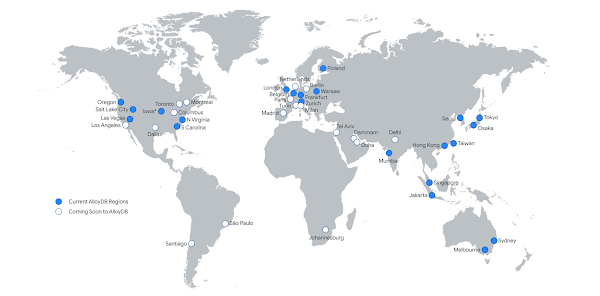AlloyDB for PostgreSQL, our PostgreSQL-compatible database service for demanding relational database workloads, is now available in 16 new regions across the globe. AlloyDB combines PostgreSQL compatibility with Google infrastructure to offer superior scale, availability and performance. In our performance tests, AlloyDB is more than four times faster for transactional workloads, and up to 100 times faster for analytical queries than standard PostgreSQL. AlloyDB is also two times faster for transactional workloads than Amazon’s comparable PostgreSQL-compatible service for transactional workloads.
AlloyDB now supports the following new regions:
Taiwan (asia-east1)
Hong Kong (asia-east2)
Osaka (asia-northeast2)
Seoul (asia-northeast3)
Mumbai (asia-south1)
Jakarta (asia-southeast2)
Sydney (australia-southeast1)
Melbourne (australia-southeast2)
Warsaw (europe-central2)
Finland (europe-north1)
London (europe-west2)
Zurich (europe-west6)
South Carolina (us-east1)
N. Virginia (us-east4)
Oregon (us-west1)
Salt Lake City (us-west3)
This brings the count of regions to 22. For a full list, see AlloyDB Locations.
Getting started
Google Cloud customers across the world can now use AlloyDB to modernize their database estates or build high-performance, highly-available applications in the cloud. You can get started with AlloyDB in just a few clicks by navigating to the AlloyDB console and creating your first cluster.
Getting started is easy with three simple steps:
Create your AlloyDB cluster
Create a primary instance for that cluster
Connect to the cluster using a psql client
Check out our quickstart for a step-by-step guide on creating a new AlloyDB cluster. Or you can use Database Migration Service to easily migrate an existing PostgreSQL database to AlloyDB.
Cross-region replication
These new regions are also great if you’re looking to leverage cross-region replication, available in preview. Cross-region replication is important for two reasons. First, it can play a critical role in your disaster recovery strategies, providing resilience against regional failures. Second, it allows you to better serve global audiences with lower latency by bringing data closer to your end users.
Expanded region support means that if you require cross-region replication, you have more flexibility in where you deploy. It also enables you to achieve compliance with national or industry regulations. For example, if your application’s primary region is Tokyo, you can now replicate to Osaka for disaster recovery, ensuring the highest resiliency without leaving the jurisdiction.
To begin using cross-region replication, just create a secondary cluster in the region of your choice, and we’ll automatically begin replicating.
Learn more
Check out the Introducing AlloyDB for PostgreSQL video for the full story on migrating, modernizing and building applications with AlloyDB. You can also learn about the technology underlying AlloyDB from our “Under the Hood” blog series. We cover the disaggregation of compute and storage in Intelligent, database-aware storage and explore AlloyDB’s vectorized columnar execution engine, which enables analytical acceleration with no impact on operational performance, in the Columnar engine blog post.
Also check our animated video series, “Introducing AlloyDB.” The first episode, What is AlloyDB?, discusses how AlloyDB provides full PostgreSQL compatibility together with accelerated database performance, high availability, and analytics integration. Be sure to subscribe for future episodes.
Cloud BlogRead More


